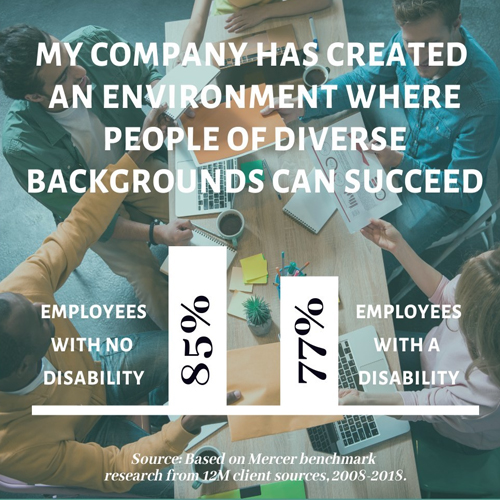Although people with disabilities represent 15% of the global population, they are often ‘overlooked’ or ‘left out’ of diversity initiatives, programmes and basic workplace inclusion discussions, according to a new report.
The ‘one-of-a-kind’ report from Global Disability Inclusion in partnership with Mercer, entitled The State of Disability Employee Engagement, reveals that there’s a significant disconnect in equity, opportunity, and how valued employees with disabilities feel at work.
“In our research investigating employment experience across diversity groups, people with disabilities have the least favourable experience by far; this includes differences by race, gender, age, and sexual orientation,” commented Dr Peter J. Rutigliano, Senior Principal, Mercer. “Unfortunately, people with disabilities have largely been ignored by corporate engagement surveys.”

DISABILITY INCLUSION
The 10-year study analysed corporate data on the experiences of 12 million employees with disabilities globally; compared to their non-disabled colleagues. The report shows that employees with disabilities are significantly less engaged; and their employment experiences rank lower than all other diversity groups. Additionally, employees with disabilities score far lower than employees without disabilities when evaluating leadership, equity and opportunity.
The report concludes that employees with disabilities do not feel their workplace offers the same opportunities; or equitable professional development, fair pay, education, ability to speak up, and ultimately advancement. They are also more fearful to come forward to raise concerns or issues at work.

ABSENT DISABILITY DATA
Although 90% of global corporations report being committed to diversity and inclusion efforts, only 4% state having a disability inclusion focus, noted the report. No wonder staff with disabilities are disengaged at work. The engagement gap of employees with disabilities shows a difference of up to 12% to 13% in some areas; and an overall difference across all categories of 6% lower than non-disabled colleagues, revealed the study.
The report concluded that firms “need to do a lot better to include and understand employees with disabilities in order to create truly inclusive and equitable workplaces”. That means ensuring that companies collect disability data as part of their diversity efforts and engagement surveys.
“”Engagement surveys influence a company’s strategy, leadership, teamwork, culture and more,” stated Meg O’Connell, CEO, Global Disability Inclusion. “However, companies rarely include or segment disability data as part of their diversity segmentation. This means companies lack information on approximately 15-20% of their employee population.” Click here for more information on the report.
The report’s findings coincide with The Valuable 500’s recent research; which reveals that disability inclusion “is still not firmly embedded in the diversity and inclusion agenda”, as reported.







































